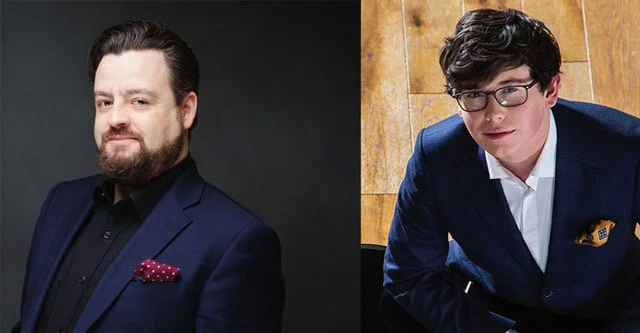JAMES GILCHRIST & ANNA TILBROOK AT THE DIVINITY SCHOOL
James Gilchrist is a coup for any international venue and for Cambridge Summer Music, an increasingly ambitious centerpiece of performance it is a real triumph. Now world famous as a tenor with a glorious gift of interpretation, he is in demand through the festival season in Europe and beyond (he tours Australia after that). And it doesn’t stop there. So accomplished are his Bach choral roles in the Easter rituals of the Matthew and John Passion he has nabbed the title of the ‘Go to Evangelist’ admired for the masterful control and palpable emotion he evinces. He is booked up for King’s College’s celebrated Paschal season next year.
The whole backpack of sonic skill was on display in his programme of songs at last night’s Divinity School performance. James Gilchrist invited us into the close circle of Clara Schuman and her stellar entourage of talent. Husband to the tormented Robert - Clara had met him when he was a sixteen-year-old student with her stern father, and she only nine years old. They married and had eight children. But the lyrical love affair that began with such hope was studded with tragedy. Robert suffered from bouts of manic insanity whilst Clara played on in concert halls across the continent to put bread on the table. Yet she still found time to compose and James Gilchrist challenged his devotees to promote her reputation from long-suffering pianist -wife of inspired creative to composer in her own right. Her music passed the test. Gilchrist gave her heavenly songs his signature dramatic treatment whilst his accompanist Anna Tilbrook infused them with a pianist’s pianist lyricism.
These artists’ social circle was a tight one. It included Johannes Brahms whose songs are – hardly a surprise – simply wonderful. There is a Schumann link here. Clara’s last child Felix (named after another dear friend Felix Mendelssohn?) was only a year old when his father died, and he remained his mother’s favourite. She send his poems to the now uber famous Brahms (who had a real soft spot for her it has to be said) and asked him for his opinion on her lad’s talent. She heard nothing - until at a rare Brahms concert, they suddenly poured forth from his piano. It must have been quite a thrill to hear Europe’s premier musician play and perform your nineteen-year-old youth’s efforts. Great he did. Poor Felix, like so many of that time (including his own sister) died only two years later from tuberculosis.
James Gilchrist’s unique skill is to inhabit a song so completely the audience is in thrall as much to his acting ability as his superb tonal range. And when it came to new material, Seven Songs by Francis Pott (the composer was there last night) Gilchrist’s wonderful range held everyone spellbound. Wonderful to know music can roll on down the generations from the German School to our own day. Francis Pott’s choice of poems was quirky and good; John Burnside’s November Morning by Michael Hartnett Swallows by Thomas Blackburn and Marriage (I didn’t catch the author) - any one of these gorgeous modern poems can be magicked up in the Internet and I for one will be giving them a whirl. Modern poetry is one thing. A bit tough for some. But with a singer with such feeling behind them and with music by a living composer who is right in touch with the zeitgeist, it’s a different cultural story.
The evening ended with a whole cycle of Herrick’s (1591-74) work by Twenties’ musician Roger Quilter – all about his adoration of the gorgeous Julia who clearly for him - had it all. James Gilchrist clearly loved Julia and her composer just as much and it was a stimulating sequence – but hard to follow the swooning romanticism of the Schumann set and the fresh originality of the brilliant Francis Pott and his very contemporary poems.
Although we baked inside the newly spiffed up (can a building be too much renovated?) it was a sumptuous treat right up the scratch for brilliant Cambridge Summer Music







